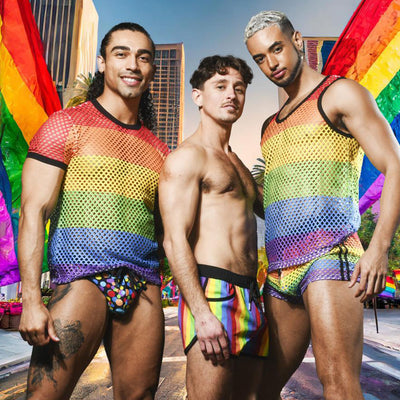Dissecting The Gay Voice
When I say, “the gay voice”, what do you hear in your head? Odds are, you’re hearing a somewhat nasally, singsong-lilted, s-emphasizing lisp of sorts. It’s no secret that media depictions of gay men more often than not come packaged with this so-called “gay voice.” But where did this voice come from, and who says it’s really THE gay voice?
Disclaimer, we’re certainly not linguists, but here’s the tea as we understand it: Basically, the Nancy Drews studying this phenomena have not yet been able to fully trace it. However, it definitely is a real thing that exists. Test show that listeners can more often than not accurately guess speakers' sexual orientations based on voice alone. So what the heck? Do gay men have gay voices because they’re gay, or is it the other way around?
Some theorize that the gay voice emerges naturally in the development of a gay man as some sort of tactic to signal his gayness to others, and… you know, attract mates. Or perhaps it’s just a natural byproduct of hanging out with women so much? These theories make a certain amount of sense, but I also know plenty of straight guys who talk with the so-called gay lisp. Anyone who grows up in a household of mainly women is at risk for developing the gay voice. Clearly, it’s an extremely complicated subject.
It’s often said that the stereotypical gay voice is more effeminate than a typical straight guy’s voice. Unfortunately, when it comes to self-loathing and internalized homophobia, the voice is an area where a lot of guys target these feelings. I personally know many guys who hate the way they talk, and this can be a real problem. Alas, as with all such cases internalized homophobia, it’s always much better to just love and accept yourself for who you are and not try to conform to some silly hyper-masculine ideal.
The bottom line is this, boys: A voice is beautiful if it speaks directly from the heart and is true... and is begging me you fuck you harder. ;) Your voice is a valuable part of your identity, so honor it. Don’t try to change your voice because centuries of homophobia have tricked you into thinking it’s uncool to speak with a little flair. The gay community is about diversity and welcoming, so the more disparate and unique voices we have, the better. Just ask the Gay Men's Chorus of Los Angeles; it takes a full spectrum of voices to achieve the most beautiful harmonies.

